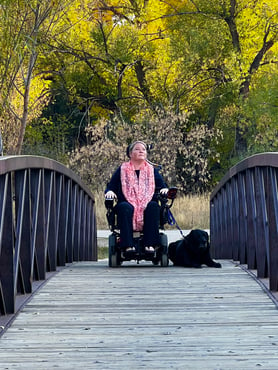The caregiver crisis has hit a new low.
I'm a full quadriplegic requiring daily physical assistance getting in and out of bed both morning and night as I'm fully paralyzed from the shoulders down. I am a sip-and-puff wheelchair user, which means I operate all my controls, including my wheelchair and computer technology, either with verbal direction or with my breath. I am dependent on caregivers for all activities of daily living.
My new reality, due to lack of caregiver assistance, is that once a week for the last couple of weeks, I've slept overnight in my power wheelchair. Not because this is a fun or comfortable idea, but because I have had no help to get to bed. This is an interesting turn of events because five years ago, I would never have considered doing this as I would be worried about having too much pressure on my backside for too long of a time. Even with regular weight shifts, skin breakdown and pressure sores are of real concern if seated in a chair for almost 2 days straight. I can see my nurses at Craig Hospital, where I did rehabilitation, hitting their forehead in shock and awe that I am now living in this place of complete desperation for staffing.
Thus far, I've slept overnight in my chair six times. The first few times weren't that bad, because it coincided with my all-nighter after a live music concert. It made sense... why ask a caregiver to arrive at my apartment after getting back from a concert at 1:00 AM when I'm just getting out of my bed at 6:30 AM a few hours later. By the time I would get tucked in, it would be time to get taken out. I figured I could sleep in my chair; what's the big deal? I managed.

The summer has ended, my concert scene has dried up, and now my all-nighters have no real purpose. Currently, the only reason I find myself sitting up in my chair at 3:00 AM is purely due to lack of help. Even though I've tried to get into a rhythm of managing through the night, there hasn't been much sleep. Partly due to discomfort, I must drain my urine bag every hour and a half to avoid dysreflexia, as urine will back up into the bladder. I have tried to drug myself to sleep with medication and pile on scarves and blankets to keep warm, yet my success rate has been rapidly decreasing. Luckily, my skin has held up, and there have been zero pressure sores or breakdowns. Yet, the more nights I spend in my chair, the more I push the envelope.
Other wheelchair users in my community share similar sentiments and experiences. We share stories of despondency, commiserating that sleeping in our chairs has become some of our new realities. Desperate times call for desperate measures, and desperate times we are in.
It is crucial to continue this conversation regarding the caregiver crisis and encourage caregivers to return to the workplace. It is stories like mine illustrating the direct result of such a crisis to truly express the incredibly deleterious effect this has on someone like myself, a full quadriplegic living alone. I can only hope that times are changing, and more kindhearted folks decide to come back out, step into the light and begin to help people such as myself once again so that I never have to sleep in my chair ever again.

